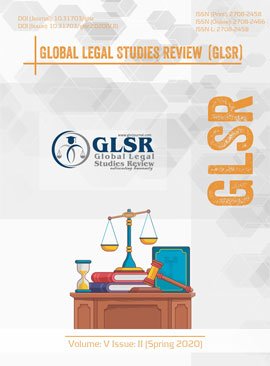01 - Military Courts: Credibility and Capacity Implications for Superior Judiciary of
http://dx.doi.org/10.31703/glsr.2020(V-I).0110.31703/glsr.2020(V-I).01 Published : Mar 2020
-
Pakistan is going through turmoil of terrorism. The State is doing what it can to eradicate this menace and in so doing established Field General Court Martial commonly known as Military Courts in wake of barbaric attack on Army Public School in December 2014. However, it is not the solution to the long standing problem motivated and nurtured by various factors like political, religious etc. Inste... Details
-
Military Courts, procedure, Supreme Court, Peshawar High Court.
-
(1) Muhammad Haroon Khan
PhD Scholar, Department of Political Science & IR, Qurtuba University of Science & IT, Peshawar, KP, Pakistan.
(2) Najib Ullah
Assistant Professor, Department of Political Science & IR, Qurtuba University of Science & IT, Peshawar Pakistan.
(3) Nazim Rahim
Assistant Professor, Department of Political Science & IR, Qurtuba University of Science & IT, Peshawar Pakistan.
02 - From Pulwama to Indian Revocation of Article 370 in Indian Held Kashmir: Policy
http://dx.doi.org/10.31703/glsr.2020(V-I).0210.31703/glsr.2020(V-I).02 Published : Mar 2020
-
Ever since India and Pakistan entered into a conflict that commenced with Pulwama attacks, the following incidents have grabbed the geopolitical situation of South Asia into odds. The region has indulged in a security dilemma so much with the possibility of a nuclear war break out between the two nuclear neighbors. The Kashmir issue is a conventional issue between India and Pakistan since independ... Details
-
Security Dilemma, Security Paradox, Indian Held Kashmir, Bhartia Janata Party, US Commission on International Religious Freedom
-
(1) Shumaila Farooq
Director of Media,Department of Media,Engineering University, Pakistan.
(2) Saima Gul
Lecturer, Department of International Relations, University of Peshawar, KP, Pakistan.
03 - Shedding Light on Khyber Pakhtunkhwa Environmental Protection Tribunal
http://dx.doi.org/10.31703/glsr.2020(V-I).0310.31703/glsr.2020(V-I).03 Published : Mar 2020
-
This paper investigate the Khyber Pakhtunkhwa province of Pakistan Environmental Protection Tribunal under the provisions of "Khyber Pakhtunkhwa Environmental Protection Act, 2014", its judicial implementation and effective working in the province. The study also focus on the newly established Khyber Pakhtunkhwa Environmental Protection Tribunal. Humans have a very close relation with nature and e... Details
-
Khyber Pakhtunkhwa, Tribunal, Environmental Protection, Peshawar, Provision.
-
(1) Tanzeel Ur Rahman
LLM Scholar, Judiciary, AWKUM, Mardan, KP, Pakistan.
(2) Ijaz Khalid
Demonstrator, AWKUM, Mardan, KP, Pakistan.
(3) Saddam Hussain
LLM Scholar, Department of Law, University of Peshawar, Peshawar, KP, Pakistan.
04 - The State of Judicial Review in 1973 Constitution of Pakistan
http://dx.doi.org/10.31703/glsr.2020(V-I).0410.31703/glsr.2020(V-I).04 Published : Mar 2020
-
The aim of this paper is to highlight the power of judicial review in the 1973 constitution of Pakistan. The three organ of the government the executive, judiciary and legislature are working in such a way that each organ is functioning in its sphere. The functions and activities may not be disturbed by each other. There is a mechanism in the 1973 constitution of Pakistan of judicial review. In th... Details
-
Judicial Review, 1973 Constitution, Executive, Judiciary, Legislature.
-
(1) Khan Faqir
Assistant Professor, Pakistan Study Centre, University of Peshawar, Peshawar, KP, Pakistan.
(2) Imtiaz Ali
PhD. Scholar, Pakistan Study Centre, University of Peshawar, KP, Pakistan.
05 - Delay in Justice is an Indicator in the Promotion of Terrorism: A Case Study of
http://dx.doi.org/10.31703/glsr.2020(V-I).0510.31703/glsr.2020(V-I).05 Published : Mar 2020
-
The pre-merger judicial system of Swat was famous for speedy justice. Even death cases were solved in days. The people of Swat expected the same judicial system from Pakistan. Civil as well as criminal cases take long time for decision with no guarantee of fairness. Maulana Sufi Muhammad raised voice for Islamic Sharia for the first time in 1990. For the sake of Islam and speedy justice the common... Details
-
Justice, Merger, TNSM, TTP, terrorism, Taliban.
-
(1) Hashmat Ali
PhD Scholar, Department of Political Science & IR, Qurtuba University of Science & IT, Peshawar, KP, Pakistan.
(2) Nazim Rahim
Assistant Professor, Department of Political Science & IR, Qurtuba University of Science & IT, Peshawar, KP, Pakistan.
(3) Aziz Ur Rehman
Assistant Professor, Department of Political Science & IR, Qurtuba University of Science & IT, Peshawar, KP, Pakistan.

 Volume IX, Issue III (Summer 2024)
Volume IX, Issue III (Summer 2024)  Volume IX, Issue II (Spring 2024)
Volume IX, Issue II (Spring 2024)  Volume IX, Issue I (Winter 2024)
Volume IX, Issue I (Winter 2024)  Volume VIII, Issue IV (Fall 2023)
Volume VIII, Issue IV (Fall 2023)  Volume VIII, Issue III (Summer 2023)
Volume VIII, Issue III (Summer 2023)  Volume VIII, Issue II (Spring 2023)
Volume VIII, Issue II (Spring 2023)  Volume VIII, Issue I (Winter 2023)
Volume VIII, Issue I (Winter 2023)  Volume VII, Issue IV (Fall 2022)
Volume VII, Issue IV (Fall 2022)  Volume VII, Issue III (Summer 2022)
Volume VII, Issue III (Summer 2022)  Volume VII, Issue II (Spring 2022)
Volume VII, Issue II (Spring 2022)  Volume VII, Issue I (Winter 2022)
Volume VII, Issue I (Winter 2022)  Volume VI, Issue IV (Fall 2021)
Volume VI, Issue IV (Fall 2021)  Volume V, Issue II (Spring 2020)
Volume V, Issue II (Spring 2020)  Volume IV, Issue I (Fall 2019)
Volume IV, Issue I (Fall 2019)  Volume III, Issue I (Fall 2018)
Volume III, Issue I (Fall 2018)  Volume II, Issue I (Fall 2017)
Volume II, Issue I (Fall 2017)  Volume I, Issue I (Fall 2016)
Volume I, Issue I (Fall 2016)